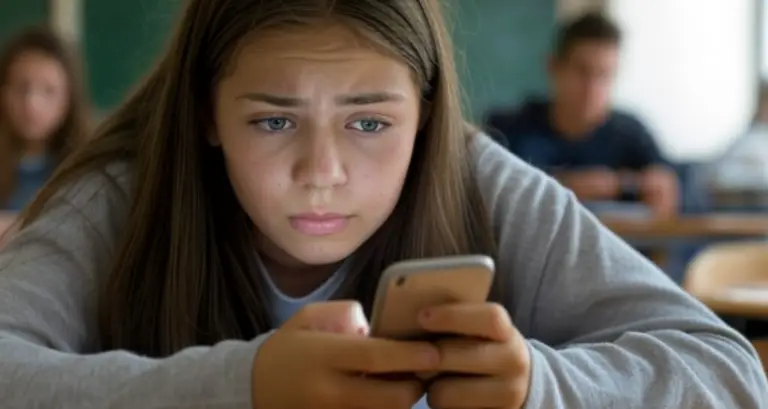The kids are not ok. And frankly, neither are the adults. We have met the enemy, and he is us—that is, the “us” that is glued to our phones.
Of course, I’ll get to the kids, but how are you doing? Personally, I have found it significantly harder to concentrate than I used to, and I blame my phone-enabled dopamine addiction.
Christian author Philip Yancey describes the problem well, framing it as a “personal crisis.
I used to love reading…I used to read three books a week. One year I devoted an evening each week to read all of Shakespeare’s plays…Another year I read the major works of Tolstoy and Dostoevsky. But I am reading many fewer books these days, and even fewer of the kinds of books that require hard work. The internet and social media have trained my brain to read a paragraph or two, and then start looking around.
Since the start of the new year, I have waged a mostly wholehearted war against this problem. My phone is now a fun desert…no X, no Facebook, no Instagram, no YouTube, no ESPN. And any games had been removed long ago. On the positive side, I am working toward greater intentionality in how I spend my “in-between” transition times. Are you fighting this battle? I’d love to hear how it’s going for you in the comments below.
For our kids and students, the evidence of the link between smartphone use and poor mental health has become so conclusive that educational leaders, politicians, and others across the political spectrum are demanding action in surprising unity.
Author and Psychology professor Jean Twenge sounded the alarm with the publication of iGen in 2017, showing how negative mental health outcomes like suicide and depression increased dramatically in adolescents starting around 2012. Coincidentally, this was the watershed year when a majority of teens had social media-connected supercomputers in their pockets pumping insecurity into their hearts with every scroll—often with very few limits on time spent or content viewed.
In 2023, the U.S. Surgeon General joined the discussion by releasing its Advisory on Social Media and Youth Mental Health, which cited the “profound risk of harm” social media poses to children and teens, especially their mental well-being. This advisory lent momentum to a 2023 lawsuit by over 200 school districts against social media companies, claiming that they knowingly designed addictive platforms that have drained school resources by fueling a youth mental health crisis.
More recently, author and thinker Jonathan Haidt tipped the scales to greater action with his 2024 book, The Anxious Generation. Haidt offers compelling evidence that replacing a play-based childhood with a phone-based childhood, along with overprotective parenting, has contributed to four factors that negatively affect mental (and physical) health: social deprivation, sleep deprivation, attention fragmentation, and addiction.
How interesting that our nation of overprotective parents has been overprotecting our kids from the wrong thing, believing that if our kids are safely in their rooms free from the dangers “out there,” then they are actually safe. Turns out it may be safer to take away their phones and kick them out of the house! I know many of you have intrinsically known that to be true. Of course, if that’s the case, we may have to stop arresting moms for allowing their 10-year-old boys to walk to the store.
My prayer is that one result of this conversation is that we repent of the idolatry of safety. While the Bible does warn us against recklessness, we are never called to make safety the top priority. Rather, the Scriptures are a veritable catalog of heroes who took bold risks to “lose their life” for Jesus, who leaned not on their own understanding and walked in the assurance of what they could not see.
Haidt’s immediate bestseller won attention from across the ideological spectrum, with endorsements or positive mentions from notables like Barack Obama and Oprah Winfrey, all the way to Jim Daly of Focus on the Family and Vice President J.D. Vance. Arkansas Governor Sarah Huckabee Sanders even mailed copies of the book to the governors of every other U.S. state.
Largely in response to these findings, at least 19 states have enacted reforms designed to limit phone use in K-12 schools, all the way from district recommendations (e.g. PA, OR, AL) to full statewide bans (e.g. FL, SC). Laws in Arkansas, Ohio, and California are currently blocked by court challenges.
What are schools doing?
Other than suing social media companies, schools and districts are taking a variety of approaches to limit phone access, including:
- Lockable or signal-blocking pouches that allow the students to keep their phones with them but limit access.
- Phone lockers that keep phones in a secure location during school hours.
- Classroom collection points—phones are collected at the beginning of each class, but students can access their phones between classes.
- Traditional classroom management policies and procedures—phones are not allowed out during class, but it’s up to teachers to manage it.
Personally, I favor the phone lockers approach, as research suggests that the proximal presence of a student’s phone, even when not being used, limits their cognitive capacity.
Surprisingly, the main obstacles to these policies are parents. One survey found that 57% of parents oppose phone bans, often because they want to be able to reach their kids without relying on the school.
One high school principal described what happened after they implemented a ban:
Shortly after we sent out communication to students and parents—that’s when the uproar began. We were getting inundated with phone calls. Parents were going to their City Council; complaints got all the way up to the superintendent’s office. You would have thought the world was going to end.
Maybe Haidt was on to something about overprotective parents?
Are reforms working?
Are phone bans improving the mental health and academic outcomes for students? Since the evidence of the harms of phone access is so overwhelming, it would seem that limits upon their use would have obvious benefits. Early anecdotal reports from schools with bans are promising.
Florida principal Heather Kreider states, “I don’t know…what went into making up that rule, but I can tell you that the result of it on a very wide scale has been extraordinarily positive for [students’] mental health.”
Seattle area eighth-grader Adi Disharoon adds, “Last year there was so much drama and now it’s so much better. I can just hang out with my friends and not worry that someone is taking a photo of me or saying something about me behind my back in a group chat.” Disharoon’s principal, Zachary Stowell, shares, “The last two years, 70% of my job has been dealing with cellphones. It felt like whack-a-mole. And now that’s removed. Now I’m talking to teachers about their teaching, which is cool.”
However, a study published earlier this month by The Lancet poured cold water on these conclusions, suggesting that phone bans showed no improvement in kids’ mental health. But Haidt pushed back, pointing out significant flaws in the study and citing other studies that do show significant benefits.
Thankfully in the world of dueling studies, we have the Scriptures and common sense to inform our judgments. There is a reason why Philippians 4:8 is set in the context of a passage that contrasts anxiety with joy and peace. Paul’s directive to set our minds on things that are pure, lovely, admirable, excellent and praiseworthy is a direct rebuke to the vast majority of content on social media, particularly the kind of content most of our teenagers are consuming.
I do hope that you serve in a school that significantly limits phone access for students, increasing your sacred opportunity to model for them how a mind set on Jesus produces peace that passes understanding. And as we battle our own phone addictions, I pray we would not be too ashamed to ask for prayer from our support networks and lean into His strength that sets us free.

David Schmus is the Executive Director of Christian Educators.
Click the button below to learn more about David Schmus.
Free to Teach is written to inform, encourage, and inspire Christian educators serving in our public schools. It should not be construed as legal advice provided by an attorney.
Want More Free to Teach?
Subscribe
Get Free to Teach delivered to your inbox.



4 Responses
It is what I have been thinking for a long time. The phone lockers is the best countermeasure. More typically admin will transfer the problem to the teacher who already has to teach content and manage behavior, now he has to collect the phone at the classroom door against the wishes of both the student and the parent. If it is a school rule it should be handled at the school entrance. If it is up to the teacher then it should be up to the teacher.
Yes, good common sense Arthur…I agree.
Hi Dave,
A little over 2 years ago my wife and I finally decided to drop our smartphones completely for “dumb phones.” One of the primary reasons we did it, besides the similar struggle with concentration that you experienced, was recognizing that our parenting was suffering because we spent so much of our in-between time on our phones. We didn’t want our daughter to grow up thinking that when you are bored you just sit on the couch and stare at a screen.
The phones we have now (I’m sure you’ve heard of Gabb phones – geared towards kids) do more than what we need, and we’ve been happy with them. Phone calls, texts, calendar, camera, calculator, alarm…
We don’t regret making the change at all, and in fact often recommend ditching the smart phone when the topic comes up.
There have been two main challenges with the phones though – one has been travel (no more navigation apps or ticketing apps), but planning like the old days is easy enough. The second is that many businesses and presenters assume you have a smartphone, so instead of giving you resources in-hand, they give you a QR code. Usually you can just ask the person and they have a way to get you the information (hey, connecting with a real human!), but that is an obstacle sometimes.
As far as improved concentration, I am not sure if we’ve rebounded completely, but here’s what I do know: We spend a lot more time reading for pleasure, more time playing and reading with our daughter, more time outside, more time developing a variety of skills, and we forget our phones more often because we’re not glued to them! Sounds like a net benefit to me.
Wow Steve, you and your wife are an inspiration. As we are now parenting “round 2” with our 2 and 4 year-olds, we have been asking these same questions. Given how much I travel, etc., I think a “phone locker” for my house might be a good option! Thank you for blessing me and others with this testimony.